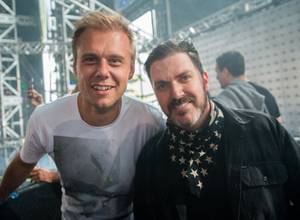Where was the idea for this type of residency born? To spend as much time as we do in Vegas and to live as close as we do, the idea of doing a residency and leaving our stage set up, as opposed to breaking it down nightly, was really appealing. We just finished 42 cities and played for 600,000 people, but that meant that every night the show got disassembled and moved. There’s something appealing and challenging about building a set that doesn’t have to be moved. You don’t have to take into account the practicality of it, being able to be broken down constantly and reassembled. So this was something that we had wanted to do for quite a while; it was just a matter of making sure we found people who were in agreement on how to do it. The Joint was the natural place to do it.
How does being able to leave the stage up increase your production value? It’s interesting, because usually when you downsize in terms of the venue that you’re playing, it means that you downsize and discard and take away from a show, whereas this gives us the opportunity to embellish and enhance a show and build a show that is specifically for the Joint. This is not the stage we toured with—it was designed specifically for this purpose, and it will show us in a different light, no pun intended.
Do you have plans for switching up the sets or anything else between nights, and are you anticipating return attendees? Well, Vegas historically turns over every week. So you have virtually a different audience weekly. Could there be repeats, could there be locals coming back? Sure, that’s certainly possible. But we’re trying to do the best show possible, which means that it’s really designed for the people who come once. It should be great for people who see it two or three times, but our primary concern is always the majority.
Does that dissuade you from playing deeper cuts during this residency? I think on the whole we’re always discouraged from doing that. You have to realize that our audience is made up of people who mostly have come to us through our most popular songs, not our least popular. So, the idea of dropping songs that the audience knows to play ones that are not on their top 10 really doesn’t make sense. It might be something that some bands do because, quite frankly, they’re bored, but that doesn’t apply to us. After 40 years, there are too many great songs, and to take their slot for something less known or less popular just doesn’t make sense.
It’s a double-edged sword, an interesting idea to play obscure tracks or to play songs that have never been in the show. But although they may please a handful of diehards, that isn’t really what we cater to. We cater to the masses, and I think most people understand that.
You definitely do cater to the masses, but isn’t there something to be said for rewarding those true diehards? We reward them by doing the best show that we can. We also reward them by setting the bar that others all try to reach. When we came on the scene, we were a wake-up call to fans as to what they should expect, which is respect and 100 percent of commitment. So every time we hit the stage we give fans what they deserve. So again, if it goes back to a handful who would love to hear an obscure track, that’s not usually feasible.
Kiss just passed the 30-year anniversary of Animalize. That record is widely regarded as nearly a solo album by you. Is that how you remember it? In the sense that I pretty much produced, arranged and played or directed most of the album, I certainly think that my handprints and my fingerprints are all over it. But I still consider it a Kiss album. It was just that my input and participation was disproportionate to what is ideal in a band. A band is supposed to be exactly that, a bunch of individuals working towards a goal, and in the case of Animalize it was me. It’s no secret that there was a period—a decade or so—where the band was more or less my baby, and that’s okay. It got us to where we are today, and it also sold millions and millions of albums, so no issue there.
If you could no longer perform or tour or no longer wanted to, would you be okay with Kiss continuing on without you? It will and I expect it to and I will do everything my power to make sure that happens. There is no reason that Kiss shouldn’t continue, because it’s bigger than any of its members. That’s always been our philosophy and that applies to the remaining members also. That doesn’t only apply to the other members who have fallen by the wayside or we have asked to leave; that applies to us. Kiss is not a rock band that plays by the normal rules. It’s far too big and far too important and far too much fun for the audience to stop just because anybody in the band doesn’t want to continue. So it will absolutely continue and should.
Would you want your replacement to wear your makeup? Absolutely. These are four iconic images—the Starchild, the Spaceman, the Catman and the Demon—that have taken 40 years of nurturing to reach the point where they are at, and to suddenly come in with Turtle Boy makes no sense. So absolutely, I would expect and demand that somebody wear my makeup.
If you take a photo of those four images to anyone anywhere in the world, they will tell you that’s Kiss, but they won’t necessarily name the members. The band is far bigger than anybody behind it.
Would you be interested in this Vegas show becoming a more a permanent residency or more frequence occurrence? Absolutely. I love Vegas, I’ve seen it since the early ’70s, and the idea of being able to hunker down and do residencies yearly or several times yearly is something I would absolutely consider.
KISS November 5, 7, 8, 12, 14, 15, 19, 22 & 23. The Joint, 702-693-5222.





